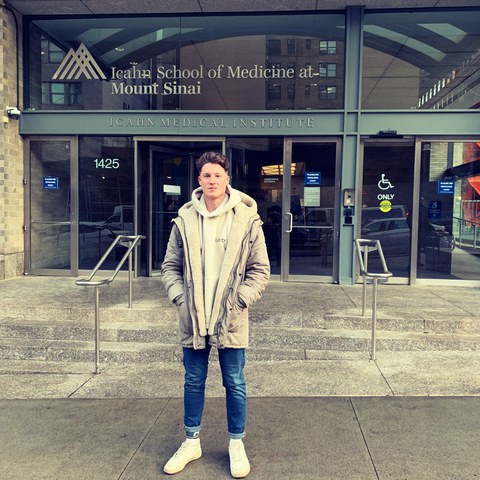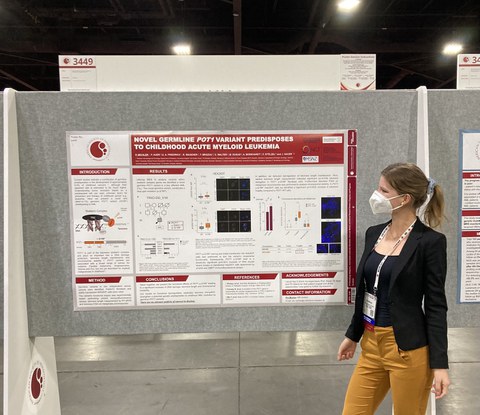Apr 14, 2022
Fast and curious – MSNZ Fellowships
Clinical Fellow of the Mildred Early Career Center Dresden (MSNZ), Dr. Nikolai Jaschke stands in front of the Icahn School of Medicine in New York. It is where he learned about various mouse models and analytical methods in the lab of Prof. Filip Swirski. And he is bringing the new methodological skills back to his Dresden lab.
Pia Michler also presented her research results on germline mutations associated with pediatric leukemias at the annual meeting of the American Society of Hematology in Atlanta. MSNZ funding has enabled both to work intensively on their research projects and to become internationally involved.
Often, Clinician Scientists lack intensive time for research. Even though numerous supporting programs have been established in recent years, there is a need for short-term interim funding. Through Clinical Fellowships, the MSNZ supports research time together with travel funds at all career stages. The intention of the funding scheme is to enable clinicians to spend time in international laboratories and to bring these new findings back to Dresden biomedical campus labs.
Nikolai Jaschke is Clinician Scientist at the BoneLab uand investigates immunotherapies against different types of cancer, that regulate the extracellular Wnt protein Dickkopf-1. For translation into practice, important mouse models are not yet established in Dresden - but they are in the laboratories of Prof. Filip Swirski, New York. The Clinical Fellowship supports Nikolai's short-term visit in the laboratory of the leading expert in the field of immunology, especially interorgan communication, innate immunity and inflammatory processes. "Learning the methodology and gaining insight into this international lab allowed me to establish the mouse models for our research in Dresden, while collaborating with the renowned scientist," says Nikolai Jaschke. Actually, Nikolai was already planning his research stay in 2021, "All the documents were ready, but the pandemia got out of hand again," he describes. "Then I took another run at it in 2022 and applied for the stays abroad. The MSNZ has always been straightforward in supporting me." In May 2022, the Clinician Scientist will defend his PhD thesis, "Dickkopf1 boosts innate cytokine responses in mice and humans," and plans to do his postdoc at Yale School of Medicine in Andrew Wang's lab.
MSNZ funding also enables Pia Michler, PhD student in pediatric hematology/oncology at the University Hospital of Dresden under the supervision of Prof. Julia Hauer to intensify her research. She is investigating whether a germline mutation of the POT1 gene is responsible for the development of childhood leukemia. She published her findings in the International Journal of Molecular Sciences in 2021. "With the help of MSNZ funding, I was already able to publish my first paper as first author. Another co-authorship on genetic predisposition to childhood leukemia is also in the pipeline. These are all definitive steps on the road to becoming a Clinician Scientist. "All MSNZ fellows have the opportunity to participate in the MSNZ Curriculum and exchange ideas within the Dresden community as well as with researchers from the other MSNZ sites in Frankfurt, Würzburg, Hamburg or Cologne/Bonn. "The MSNZ network and curriculum is a total asset. I was already able to discuss my results at the MSNZ Germany meeting last August. Through the DataViz and Clinical Science Meetups, I was also able to optimally prepare my poster presentation and exchange ideas with peers and coaches on site.
The MSNZ Clinical Fellowships call is permanently open. The MSNZ team will be happy to support your ideas. Speaker of the program Prof. Martin Bornhäuser emphasizes, "We are pleased that despite the ongoing pandemic situation, the MSNZ Fellowships provide research stays and thus important career steps for Dresden-based Clinician Scientists. Access to our MSNZ network and continuing training opportunities also play an important role and is used to a great extend."



